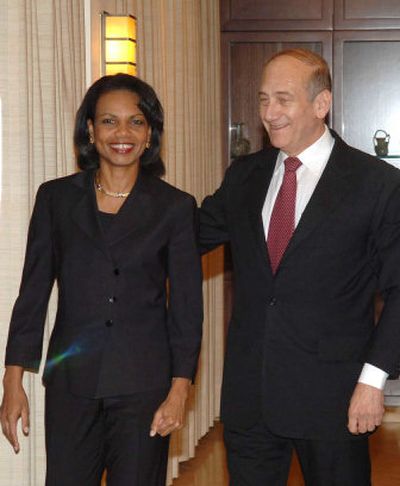Rice visit sees Israeli pullback

BEIRUT, Lebanon – Israeli troops pulled back from a Lebanese border town Saturday after a week of heavy fighting with Hezbollah guerrillas who hailed the retreat as a victory. Secretary of State Condoleezza Rice returned to the Middle East to push a refined U.S. peace plan.
The Israeli pullback from the town of Bint Jbail appeared to be in preparation for a new incursion along a different part of the border zone. Hours later, troops and tanks massed farther to the east on the Israeli side of the frontier, Lebanese security officials said early today.
Lebanese civilians were suffering the most from the fighting, which erupted after Hezbollah kidnapped two Israeli soldiers in a cross-border raid July 12. On Saturday, warplanes struck outside the market town of Nabatiyeh, crushing a house and killing a woman, her five children, and a man in a nearby house, Lebanese security officials said. In the southern port city of Tyre, volunteers buried 31 victims of the bombardment in a mass grave, among them a 1-day-old girl.
Israel made its closest strike yet to Hezbollah ally Syria. Warplanes hit the Lebanese side of a Syrian-Lebanese border crossing, forcing the closure of the main transit point for refugees fleeing and humanitarian aid entering Lebanon. Two more missiles hit the area early today.
Hezbollah leader Sheik Hassan Nasrallah marked Rice’s arrival with a threat to fire rockets even deeper into Israel. Appearing on Hezbollah television, Nasrallah claimed victory, saying Israel had failed to make a “single military achievement” during its 18-day offensive.
Still, Rice said she was encouraged by a tentative Hezbollah commitment to allow international troops into southern Lebanon and eventually disarm. She met with Israeli Prime Minister Ehud Olmert in Jerusalem on Saturday evening, and was expected to stop in Lebanon though no visit was announced.
She said compromises will be needed from everyone.
“These are really hard and emotional decisions for both sides, under extreme pressure in a difficult set of circumstances,” Rice said. “And so I expect the discussions to be difficult but there will have to be give-and-take.”
Israel Radio reported Rice plans to travel to the United Nations on Tuesday and hopes the Security Council can prepare a resolution calling for a cease-fire on Wednesday. The report said Israel would not agree to stand down until Hezbollah was incapable of resuming rocket fire into Israel.
The question of Hezbollah’s sincerity toward negotiations is crucial to Rice’s second attempt to broker a cease-fire. The United States and Israel insist any deal must ensure Hezbollah guerrillas are pushed back from Israel’s northern border before fighting can stop.
Nasrallah said he would cooperate with the Lebanese government in negotiations toward ending the crisis. But he was vague about how far he would go, and suggested that disarmament would be off the table if conditions outlined by Lebanon are not met – including the resolution of a border dispute with Israel.
Despite its intense bombardment of Lebanon – and heavy ground fighting near the border – Israel has been unable to stop barrages of hundreds of Hezbollah rockets. Guerrillas fired at least 90 rockets into Israel on Saturday, lightly injuring five people.
Israel has said it will launch a series of limited ground incursions into Lebanon to push back guerrillas, rather than carrying out a full-fledged invasion. The pullback from Bint Jbail suggested that thrust, launched a week ago, had ended.
Lebanese officials reported a massing of troops and tanks near the Israeli town of Metulla farther to the northeast, on the tip of the Galilee Panhandle near the Golan Heights, indicating another incursion could begin soon.
Like Bint Jbail, the Lebanese town of Khiam just across the border from Metulla is one of the largest in the border zone. Khiam has been under intense bombardment in recent days – including a strike that hit a U.N. post nearby and killed four observers on Tuesday.
Israel’s pullback of its forces from Bint Jbail ended the bloodiest siege in what has so far been only a limited ground incursion into southern Lebanon.
The pullback gave Hezbollah the opportunity to claim its fighters had driven out Israel’s war machine.
Nasrallah said his guerrillas had dealt Israel a “serious defeat” in the town. “This elite force was fleeing and scurrying like mice from the battleground,” he said.
Eighteen soldiers were killed in the town – nine of them in Hezbollah ambushes Wednesday, the military’s worst one-day loss in the campaign. Maj. Gen. Udi Adam, head of Israel’s northern command, said dozens of guerrillas were killed in the week of fighting. But Hezbollah acknowledges the deaths of only 35 fighters in the entire 18 days of warfare.
At least 458 Lebanese have been killed in the fighting, according to a Health Ministry count Friday based on the number of bodies in hospitals, plus Saturday’s deaths. Some estimates range as high as 600 dead, with many bodies buried in rubble.
Thirty-three Israeli soldiers have died, and Hezbollah rocket attacks on northern Israel have killed 19 civilians, the Israeli army said.